High vowel lenition/devoicing in French
« previous post | next post »
On a trip to Québec in the 1970s, I asked a passerby for directions (in French), and he gave me an answer that at first I thought was in Polish or some other Slavic language unknown to me. He also pointed to the visible train-track overpass a couple of blocks away, and waved his arm to indicate a right turn, so I got the meaning from his gestures. And after a bit, I realized that his opening phrase, which I heard as something like
[tvɐ.drɛk.tʃsko.trɐk]
was a Québecois vernacular version of "tu vas direct jusqu'au trac", with the [i] and [y] vowels deleted (and the initial /ʒ/ of "jusqu'au" devoiced). I asked a Canadian colleague about it, and was told that the deletion of high vowels was known to linguists in Francophone Canada, but (as far as he knew at that time) had not been documented.
There certainly are plenty of treatments in the more recent literature, but a Google Scholar search also turned up a paper from 1959: Jean-Denis Gendron, "Désonorisation des voyelles en franco canadien", Canadian Journal of Linguistics/Revue canadienne de linguistique (1959). Prof. Gendron started the paper this way:
Il existe dans le français de Paris, par suite de certains groupements de sons, des désonorisations qui concernent uniquement les consonnes; mais jamais aucun phonéticien, à notre connaissance, n'a signalé le fait pour les voyelles. C'est que la prononciation parisienne normale accorde à tous les sons d'un mot une égale importance, quelle que soit sa position syllabique ou son entourage consonantique. La prononciation canadienne, moins attentive et moins ferme, désonorise les voyelles fermées ainsi que les semi-consonnes, menaçant, en quelque sorte, l'intégrité du mot.
In Parisian French, as a result of certain groupings of sounds, there are devoicings that only concern consonants; but no phonetician, to our knowledge, has ever reported the fact for vowels. This is because normal Parisian pronunciation gives equal importance to all the sounds of a word, regardless of their syllabic position or their consonantal environment. Canadian pronunciation, less careful and less strict, devoices high vowels as well as semi-consonants, threatening, in that way, the integrity of the word.
We could spend some time on how the carelessness of earlier French speakers threatened the integrity of their Latin words. But we'll reserve such pleasantries for another day, and focus instead on some cases of high vowel devoicing in standard French that I recently stumbled on.
I noticed it the first example in my recent dive into "focus"-like phenomena in French, where I remarked that "the following phrase lacks any obvious "focus"-like elements, but does illustrate some extreme lenition phenomena — more on French lenition in the future…"
The part that's relevant to this post is the pronunciation of "décidément":
Dividing it acoustically in two, here's the first two (nominal) syllables, "déci":
…in which the high vowel /i/ is basically devoiced and assimilated phonetically into the preceding /s/.
And the second two, "dément", immediately following:
Some people might think that this is a speech error — but here's an example from another French radio broadcast:
décidément en politique on ne donne rien pour rien
definitely in politics they don't give something for nothing
And again zeroing in on the word décidément:
The first two (nominal) syllables:
And the last two syllables:
There are some other contexts where similar high-vowel-devoicing effects seem to be pretty common in standard French. One is the pronunciation of tout in phrases like "tout à l'heure", "tout à fait", etc.
I'll give one example of each, also from French radio broadcasts. (This again is anecdotal evidence — but on the other hand, these were the first instances of those common phrases that I looked at — and several subsequent examples were similar…)
First, an example of tout à l'heure:
nous recréerions des régimes spéciaux comme cela a été dit tout à l' heure
et nous ne le voulons pas
we might recreate special systems as was said earlier
and we don't want that
Zeroing in on the phrase "tout à l'heure":
And the syllable "tout":
Now, an example of tout à fait:
et je retrouve {euh} tout à fait regrettable et v(ous) pour tout dire absolument non crédible la position de la majorité qui est de dire {breath} jamais nous n' augmenterons les impôts
and I find {uh} quite regrettable and you- to put it bluntly absolutely not credible the position of the majority which is to say {breath} we will never increase taxes
Again, zeroing in on the phrase "tout à fait":
And the word "tout":
So maybe standard French has changed since 1959 — or maybe Québecois high vowel devoicing has deeper roots than Prof. Gendron thought?
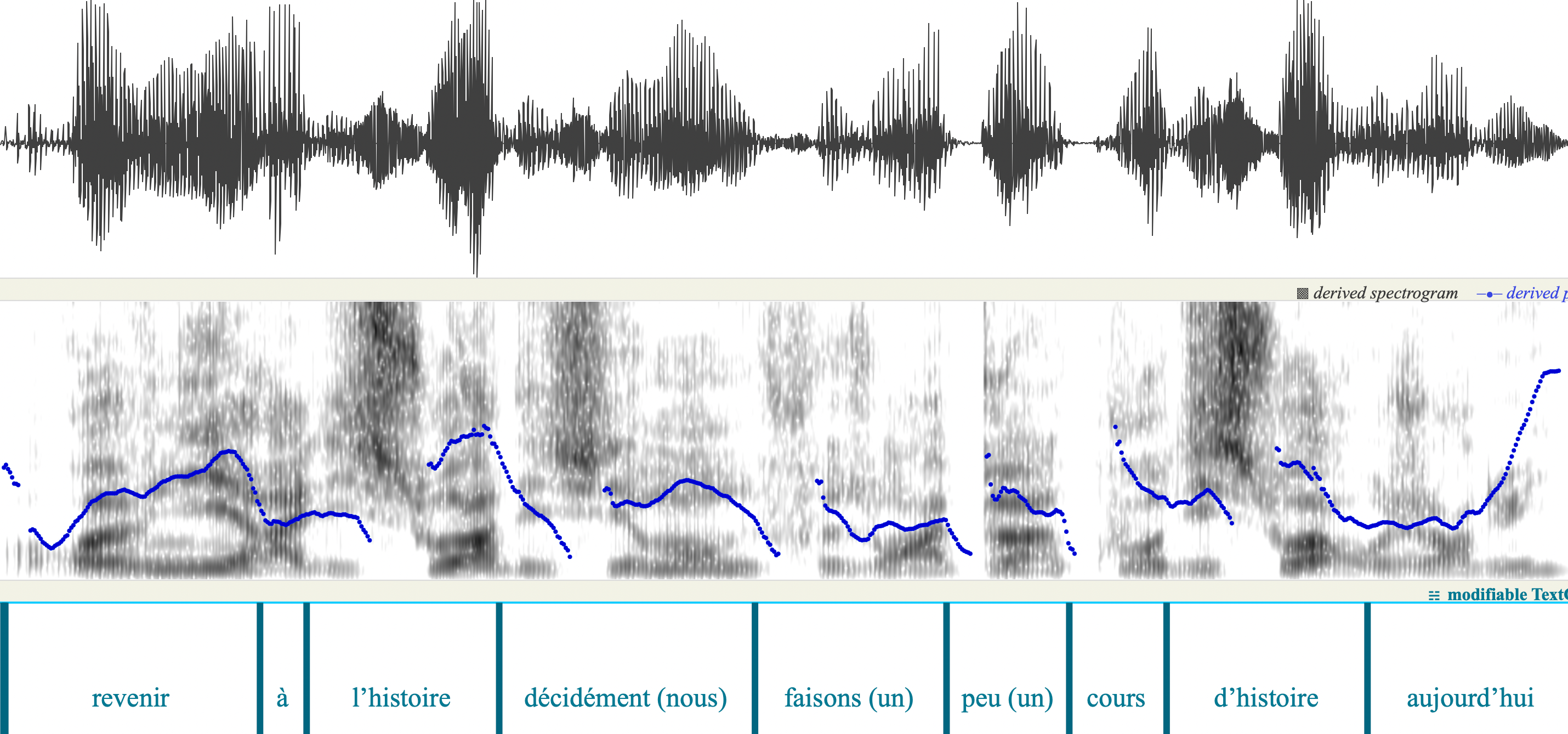
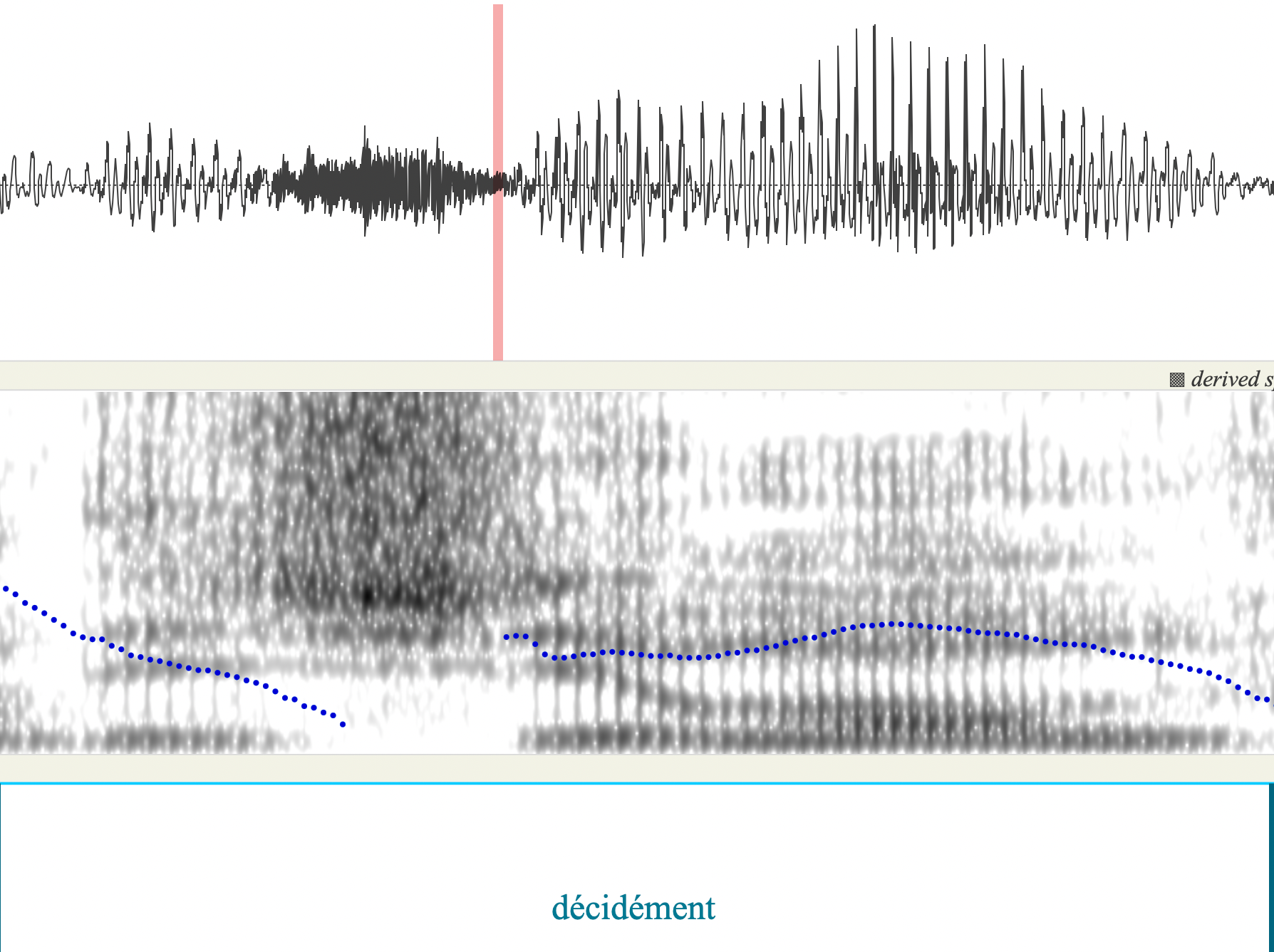
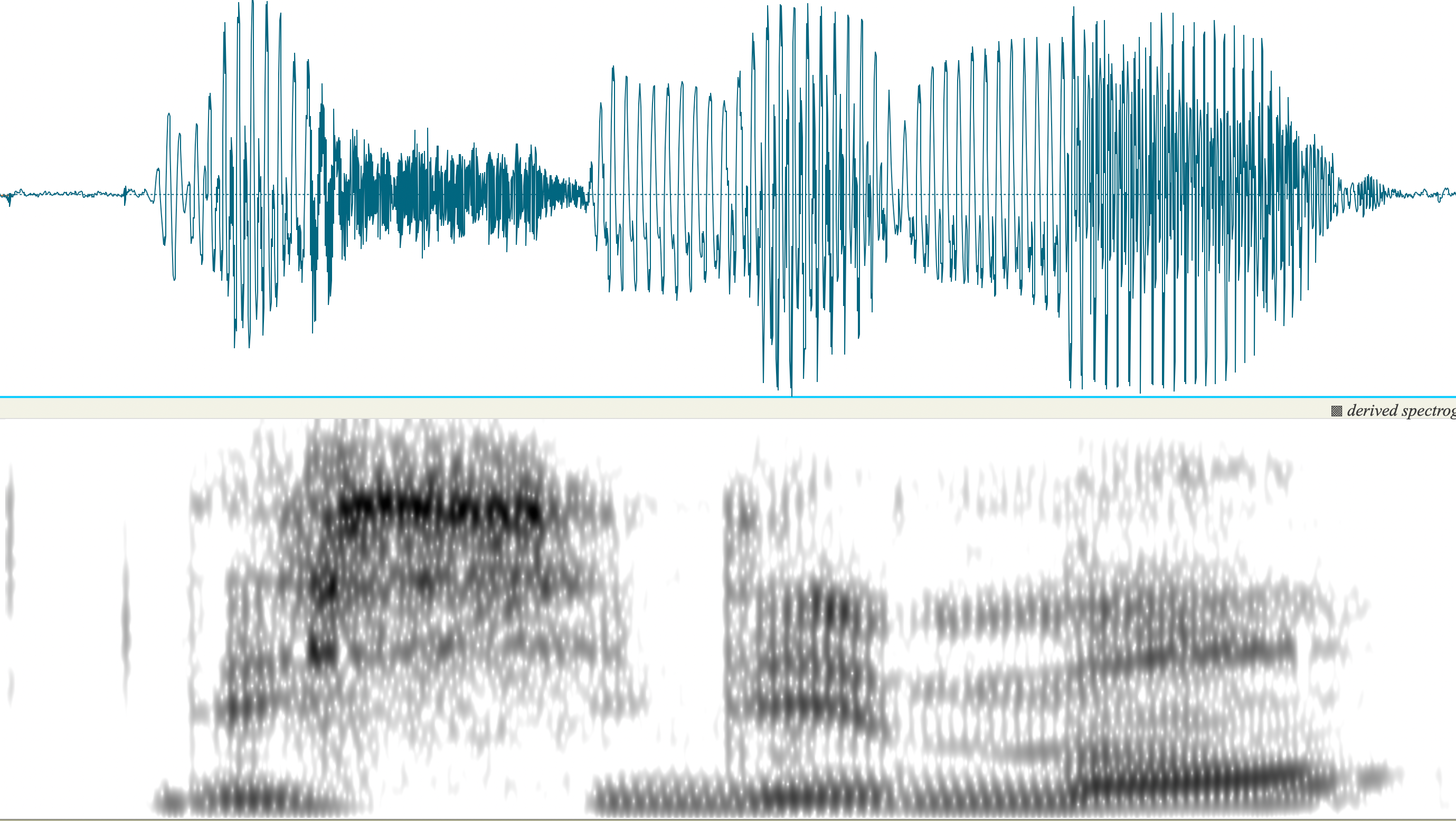
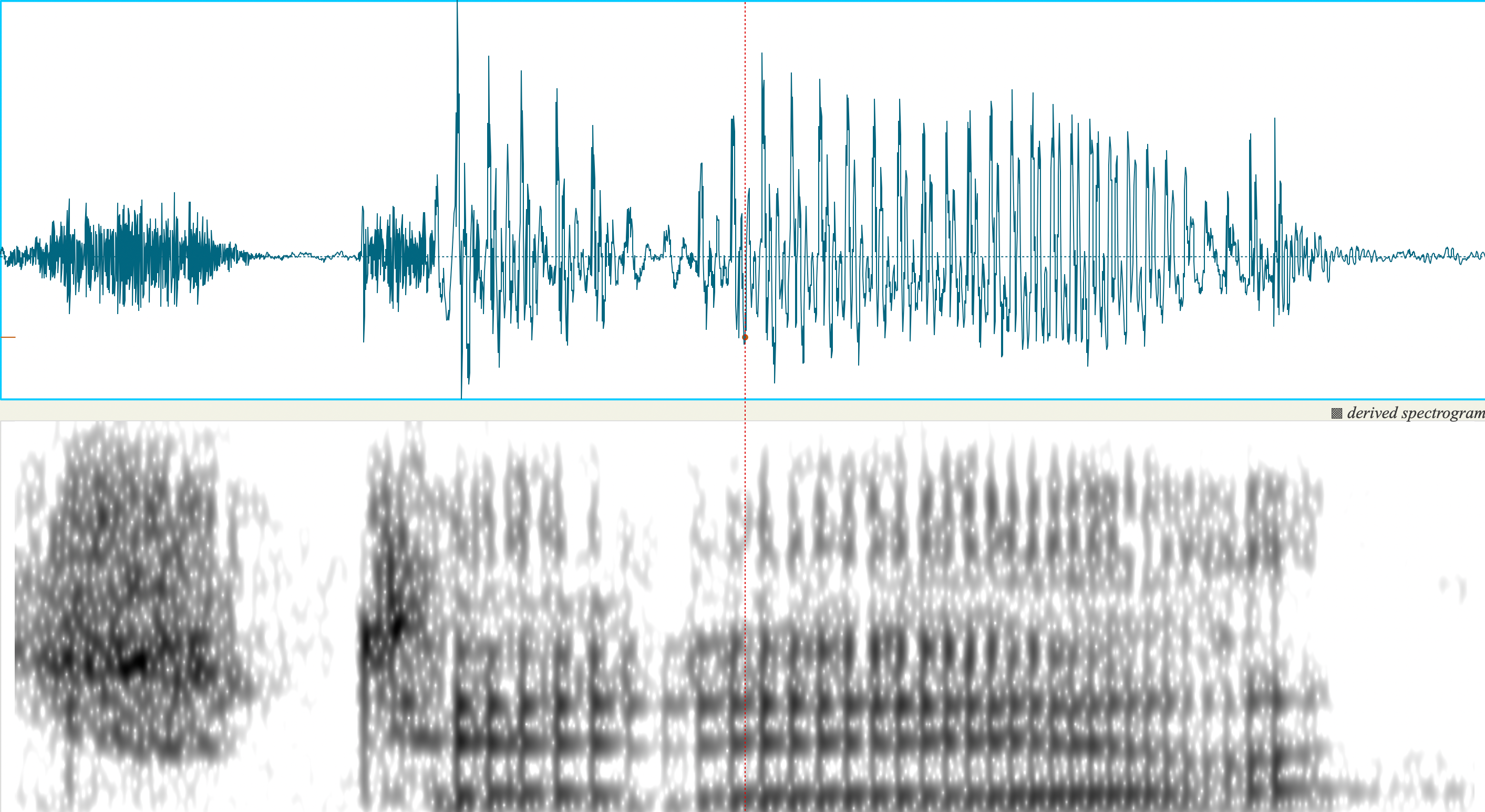
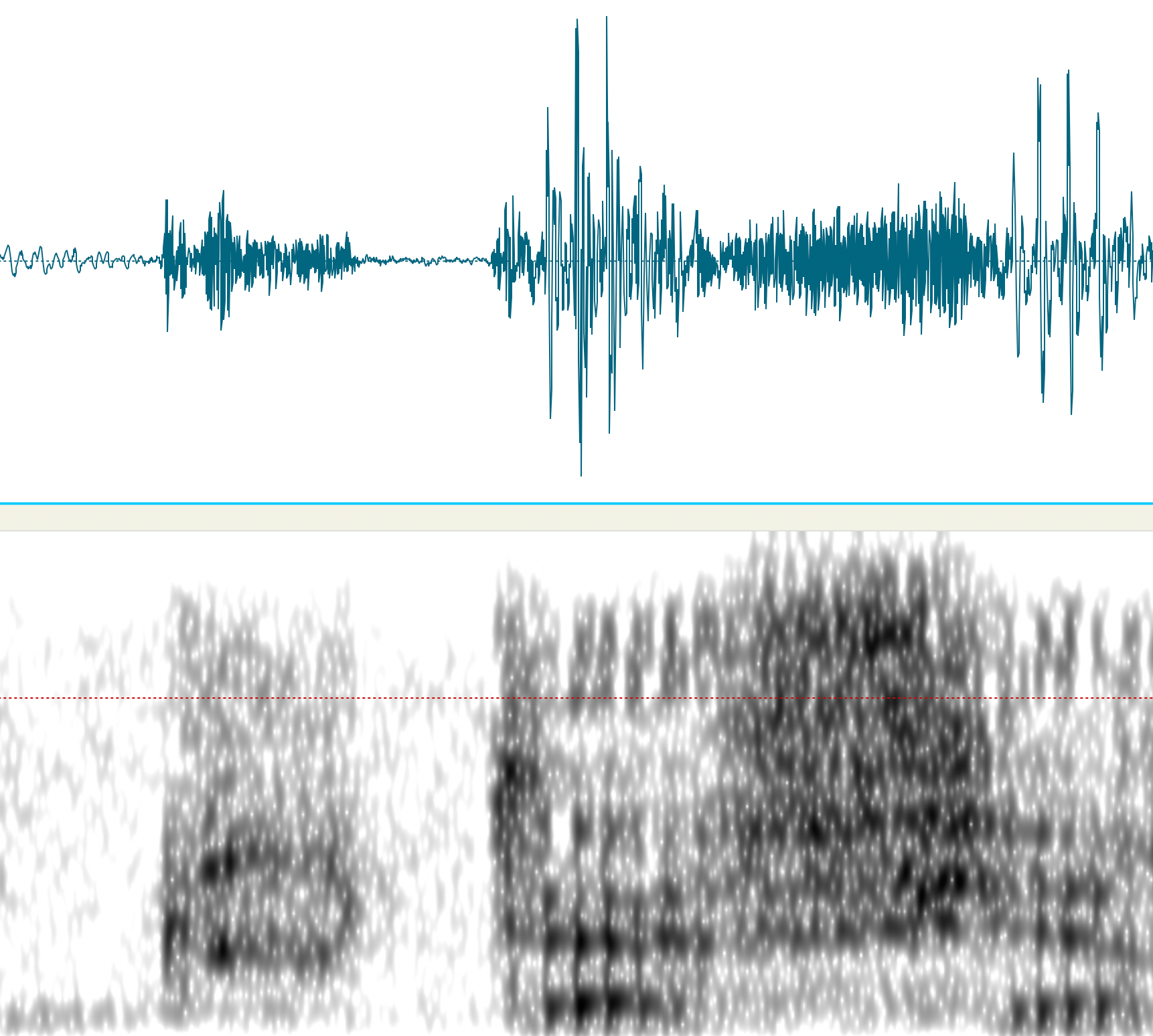
Bybo said,
April 18, 2024 @ 4:11 pm
There's a typo in the Gendron quote (a notre connaissance → à notre connaissance).
Chris Button said,
April 18, 2024 @ 5:37 pm
The devoicing seems much more salient in the first example of décidément than the second example.
You can see the difference in the spectograms in addition to clearly hearing it.
It's interesting how the second d in the second example is also more salient–presumably as a consequence of less devoicing. In the first example, it's almost like the second d belongs to the preceding syllable instead.
JPL said,
April 18, 2024 @ 7:24 pm
Wow! The difference between the two cases of "tous/tout(es) is striking (here and in the earlier post on "Victor Hugo, helas"). In light of this, it looks like the accuracy of the statement, "C'est que la prononciation parisienne normale accorde à tous les sons d'un mot une égale importance, quelle que soit sa position syllabique ou son entourage consonantique." is called into question (as well as that "French lacks any prosodic signaling of "focus""). It looks like the relevant difference between the two sets of utterances (of tous/tout(es)) can only be described as a difference in suprasegmental (prosodic) properties of the utterances (loudness, pitch, duration of sonorance), and a difference in significance of that element of the utterance describable as stressed vs. unstressed, focused vs. not focused, intended foregrounding vs. backgrounding of attention, presence vs. absence of semantic contrast, etc. "Random anecdotes like these are easy to find, and confirm my impression that French speakers make frequent communicative use of the prosodic features — duration, pitch, amplitude — that are associated with (the many meanings of) the term "focus" in languages like English." Indeed.
carveuir said,
April 19, 2024 @ 3:40 am
Ha! As a final-year undergraduate in 2015, I mentioned having come across devoicing of the second /i/ in "université" to my French linguistics tutor and he didn't believe me. Finally I've been vindicated.
Chris Button said,
April 19, 2024 @ 7:08 am
And it's the same conditioning environment after "s" as after "c" in décidément.
It reminds me of Japanese standard devoicing of "u", which effectively surfaces as [ɨ], after "s"
Chris Button said,
April 19, 2024 @ 7:13 am
And to JPL's point, focus/stress (let's go with prosody) is surely a factor–in Japanese and French.
Chris Button said,
April 20, 2024 @ 7:10 am
But décidément is interesting because the following consonant is voiced d rather than t, and a voiceless following consonant (or pause) would be a requirement in Japanese too
Anon_QC said,
April 21, 2024 @ 9:02 pm
Being from QC myself, and having skimmed some literature some years ago, I do think devoicing is absolutely a thing for high vowels near some consonants. "Pister", for instance, has a totally devoiced first syllable in casual speech.
What struck me from your examples, especially the tentative IPA transcription of the interaction from the 70s, is the lack or palatalisation/affrication so prevalent near high vowels. "tu" is [tsy], for instance. In my own, very casual vernacular (from the Saguenay-Lac-St-Jean area, no less), "tu vas direct sur la track" might come out as [tsvɒdzʁɛksaːtʁak].
Julian said,
April 22, 2024 @ 4:17 am
Anon_QC
In Bottine Souriante's song "Belle Virginie", "batiment" comes out almost as "botsiment"
Sanchuan said,
May 17, 2024 @ 4:39 am
Some French speakers seem to be aware of this. I just stumbled on a short conversation online about vocalic devoicing (It doesn't predate this post but doesn't seem influenced by it either.) The claim is made, with a certain degree of matter-of-factness, that:
"French can devoice and delete high vowels (phonological) word internally, when they're adjacent to voiceless consonants, so that for example "citation", "tu sais" or "de toute façon" are pronounce with voiceless vowels that can be deleted altogether (especially in frequent sequences like t'sais or t'façon). Deletion is blocked in stressed syllables (and for me at least, it's also blocked in non-clitic penults, which tend to be invaded by the final syllable stress)."
The latter remark would seem to block devoicing in the word "université", at least for this speaker. Other examples cited include the final vowels in "Je vais à Nancy" and "Ton livre, je l'ai lu", which indeed are often heard devoiced.
Link: https://forum.wordreference.com/threads/unvoiced-devoiced-voiceless-vowels-in-european-languages.4092101/
Sanchuan said,
May 17, 2024 @ 4:49 am
(I realise that the "y" and the "u" in the final two examples may get devoiced out of fortition rather than lenition, but the point about words like "citation" is decidedly relevant.)